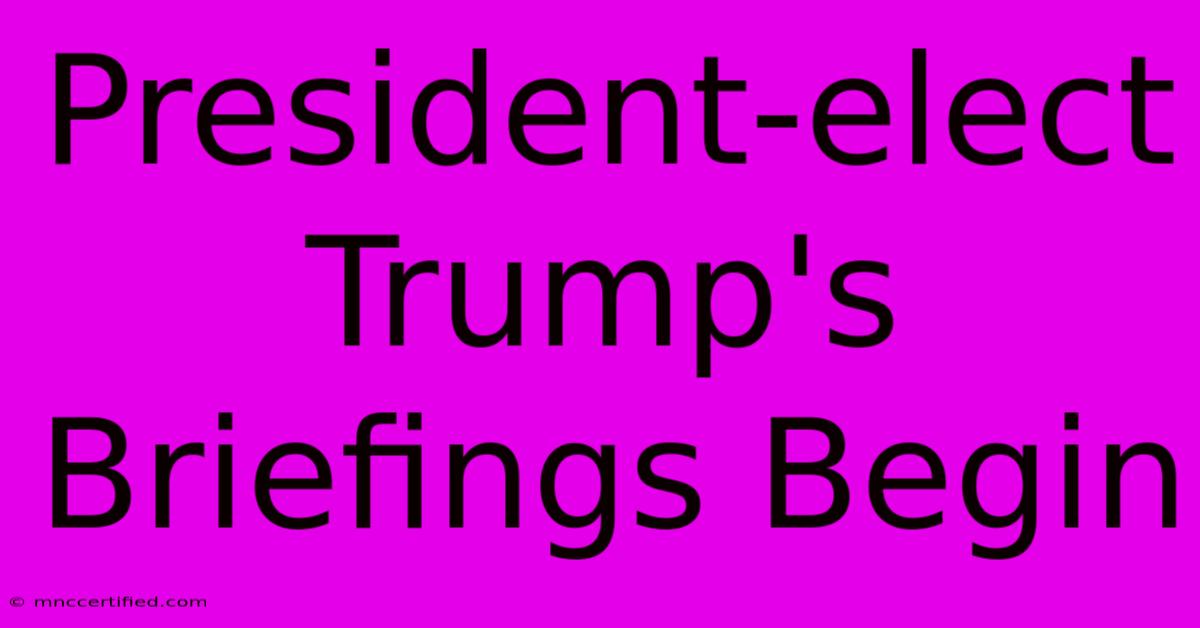President-elect Trump's Briefings Begin

Table of Contents
President-elect Trump's Briefings Begin: A Look at the Transition Process
The period between a presidential election and the inauguration is a crucial time of transition. For President-elect Trump, this period marked the beginning of receiving crucial national security and intelligence briefings, a critical step in preparing to assume the highest office in the land. This article delves into the details of these briefings, examining their significance and the challenges they presented.
The Importance of Presidential Briefings
Presidential daily briefings (PDB) are not merely summaries of current events; they are highly classified reports providing insights into the most sensitive national security issues. These briefings equip the incoming president with the information necessary to make informed decisions from day one. The briefings cover a wide range of topics, including:
- National Security Threats: This encompasses terrorism, cyber warfare, nuclear proliferation, and other potential threats to the United States.
- Foreign Policy: Briefings detail relationships with other countries, ongoing diplomatic initiatives, and potential international conflicts.
- Domestic Issues: While less prominent than national security concerns, domestic challenges such as economic stability and major policy decisions are also discussed.
- Intelligence Assessments: These briefings synthesize information gathered from various intelligence agencies, offering a comprehensive overview of current global situations.
The comprehensive nature of these briefings is vital, ensuring the incoming president is adequately prepared for the responsibilities ahead. The gravity of the information shared underscores the importance of a smooth and thorough transition process.
Challenges During the Transition
President-elect Trump's transition period was marked by some unique challenges. These included:
- Public Statements: Unlike previous transitions, President-elect Trump made frequent public pronouncements, sometimes contradicting information provided during briefings, which raised concerns about the handling of sensitive intelligence.
- Personnel Changes: The composition of the briefing team and the transition team itself experienced significant changes, potentially impacting the efficiency and consistency of the briefing process.
- Relationship with the Intelligence Community: Reports suggested a strained relationship between President-elect Trump and parts of the intelligence community, which could have affected the openness and transparency of the briefings.
The Content of the Briefings
While the specific content of the briefings remains classified, reports suggest they covered a range of urgent matters, including:
- Cybersecurity Threats: The increasing reliance on technology made cybersecurity a critical topic in the briefings.
- Global Terrorism: The ongoing threat of terrorism from various groups worldwide remained a central focus.
- North Korea's Nuclear Program: The escalating nuclear ambitions of North Korea were undoubtedly a key subject of discussion.
- The Situation in the Middle East: The complexities of the Middle East, including conflicts and diplomatic efforts, were likely extensively detailed.
The sheer volume and sensitivity of the information presented highlight the immense responsibility placed on the incoming president.
The Legacy of the Briefings
The briefings received by President-elect Trump laid the groundwork for his administration's approach to national security and foreign policy. Analyzing his subsequent actions in office, it's possible to trace the influence of the information presented during this critical transition period. Understanding the context of these briefings provides a valuable perspective on the early days of his presidency and the decisions he made.
Further research into declassified documents and analyses of the Trump administration's actions will undoubtedly provide a richer understanding of the impact of these initial briefings.
Conclusion
The presidential transition process is critical to ensuring a smooth handover of power and the ongoing security of the nation. President-elect Trump's briefings represent a crucial stage in this process, providing him with the essential information required to face the complex challenges of the presidency. Although certain aspects remain shrouded in secrecy due to national security concerns, understanding the context and significance of these briefings is essential for a complete understanding of the Trump presidency's beginnings. Further scholarly work is needed to fully analyze the long-term impact of these initial briefings on his policy decisions.

Thank you for visiting our website wich cover about President-elect Trump's Briefings Begin. We hope the information provided has been useful to you. Feel free to contact us if you have any questions or need further assistance. See you next time and dont miss to bookmark.
Featured Posts
-
Riddle Insurance Madisonville Ky
Nov 22, 2024
-
Top 3 Fits For Justin Fields After Steelers
Nov 22, 2024
-
Indian Billionaire Adani Faces Us Charges
Nov 22, 2024
-
The Palace Coral Gables On Uk Tv
Nov 22, 2024
-
Icelands Volcano Erupts Again
Nov 22, 2024